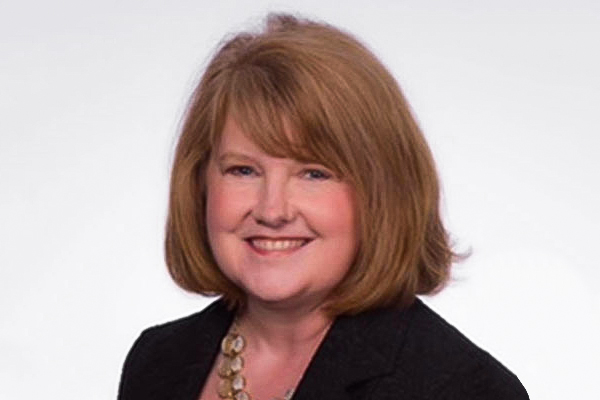July 15, 2022

Mollie Scott, Pharm.D. remembers the moment she was admitted to the UNC Eshelman School of Pharmacy in 1989.
She was working as a pharmacy intern at then Glenwood Village Pharmacy in Raleigh, N.C., when she received a phone call from her mother in Asheville, N.C., letting her know her acceptance letter had arrived in the mail. When Scott relayed the news to nearby customers having lunch in the pharmacy, they erupted into applause.
“I’ll never forget that,” she says with a fond smile.
Her path to that moment was winding. Scott grew up thinking she wanted to be a veterinarian. From ages 15-20, she spent time working in emergency veterinarian clinics in Asheville and Raleigh. In fact, that’s where she met her now husband of 29 years, veterinarian Dr. Robert Scott.
But Scott said she never had a mentor to learn from and guide her through veterinary medicine, so she decided to transition to people. She explored family medicine before finding her passion in pharmacy during her undergraduate days studying biology at Meredith College in Raleigh.
Today, Scott is the Regional Associate Dean for the UNC Eshelman School of Pharmacy’s Asheville Campus and Chair of the Director of Pharmacotherapy at the Mountain Area Health Education Center (MAHEC). She is championing health equity through mentorship and building partnerships, just as she’s done for decades.

Guidance of mentors
Scott credits her success in pharmacy to the many mentors she’s had along the way. From a physics professor at Meredith who encouraged her to explore pharmacy as a career path, to a pharmacist at Glenwood Village Pharmacy who taught her the importance of displaying compassionate care always, mentors are crucial, she says.
“At the pharmacy, we often delivered medications to our patients. I recall my mentor, Myra Brickell, readying azidothymidine for a patient with HIV. Back then, HIV was a death sentence and it was stigmatized,” Scott said. “Myra knew the patient loved Hershey bars with almonds, so she would always take one off the shelf and slip it into his bag for delivery. It was there that I learned how to treat patients with kindness and empathy. She inspired me.”
Today, Scott passes on that spirit of kindness by mentoring pharmacy residents and connecting the UNC Eshelman School of Pharmacy to partners like MAHEC to advance health care for patients across North Carolina.
Building partnerships to improve health care for patients
This year, with Scott’s help, MAHEC announced the formation of a new department of pharmacotherapy at its UNC Health Sciences at MAHEC campus. The department, chaired by Scott, firmly anchors the UNC Eshelman School of Pharmacy on MAHEC’s campus alongside programs affiliated with UNC’s top-ranked schools of medicine, public health, and dentistry, with the goal of improving health across Western North Carolina.
“Mollie has served MAHEC and Western North Carolina in more ways than I can count. She is not only the obvious choice to lead our department of pharmacotherapy, she is the best choice. From clinical care to her role as an educator, her acumen and experience are superb,” said Bill Hathaway, CEO of MAHEC.
The new department houses MAHEC’s growing pharmacotherapy initiatives that include clinical pharmacists, ambulatory care and geriatric pharmacy residencies, rural inteprofessional primary care, a home-based primary care program, the Center for Healthy Aging, and research focused on improving health through collaborative care.
“We’re excited to transition to a stand-alone department and contribute to MAHEC’s strategic initiatives at a higher level,” Scott shared. “We have played an integral role in interprofessional education and practice at MAHEC for decades. As MAHEC prepares to establish an on-site 340B pharmacy, our pharmacists and pharmacy technicians will play an increasingly important role in expanding access to high quality whole-person care.”
This isn’t Scott’s first initiative with MAHEC. Over the years, she’s helped the organization develop pharmacy ambulatory care services, and establish their first pharmacy residency training program.
In addition to expanding health partnerships at MAHEC, Scott has also worked to advocate for patients through the North Carolina legislature. Recently, Scott led a team of faculty members from the School’s Practice Advancement and Clinical Education Division in developing resources for House Bill 96, which expands health care to allow pharmacists to initiate hormonal contraception, glucagon, vaccines, prenatal vitamins, smoking cessation, and post-exposure prophylaxis for HIV.
As for the future, Scott said she hopes to continue to help develop innovative programs that haven’t existed before, aligned with the School’s newly launched BEYOND Strategic Plan, with the goal of reducing barriers and improving health equity for patients.
“Over the next 3-5 years, I want to focus on our partnership with MAHEC to create services that didn’t exist before and to incorporate our students and residents into those services to better equip the next generation of health care providers,” she said.
Latest News

Dean Angela Kashuba receives Carolina Alumni Faculty Service Award

RASP poster presentations capture student research


